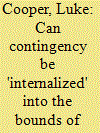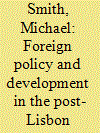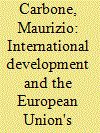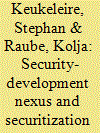|
|
|
Sort Order |
|
|
|
Items / Page
|
|
|
|
|
|
|
| Srl | Item |
| 1 |
ID:
126631


|
|
|
|
|
| Publication |
2013.
|
| Summary/Abstract |
Can general mechanisms governing social life (necessity) and the possibility of multiple outcomes in socio-historical processes (contingency) be incorporated into a single theoretical framework? In recent years, the critical realist philosophy of science has emerged as an intellectual strand within international relations (IR) that makes theoretical claims about necessary social processes while recognizing the irreducible role of contingency. However, critical realist scholars treat contingency as an 'externality', thereby declining to theorize social processes that result in contingent outcomes. Here, it is argued that contingency emerges out of the combination of events and processes as theorized by the law of uneven and combined development. This provides a general conceptualization that treats differentiated historical outcomes, and their contingencies, as inherent to human development. Out of these assumptions a workable approach to historical sociology in IR can be developed-one predicated upon uncovering the form of historical 'combination', the contingent fusion of elements, in international systems.
|
|
|
|
|
|
|
|
|
|
|
|
|
|
|
|
| 2 |
ID:
126627


|
|
|
|
|
| Publication |
2013.
|
| Summary/Abstract |
The European Union (EU) has a long tradition of involvement in development policy and can claim to be the world's most influential donor when the activities of its member states are aggregated. Recently, however, this position has been challenged by the rise of new donors and models of development assistance, by the changing needs and positions of recipients and by institutional change within the EU itself. This article explores these issues by focusing first on the nature of EU foreign policy, and then on the ways in which it has interacted with the changing trajectory of development policies to create new issues and problems. It concludes that the EU's position remains central and significant to global development policy, but that this position faces important challenges to which the response is as yet uncertain.
|
|
|
|
|
|
|
|
|
|
|
|
|
|
|
|
| 3 |
ID:
126625


|
|
|
|
|
| Publication |
2013.
|
| Summary/Abstract |
This special section explores and explains how the European Union's (EU's) overall approach to international development has evolved since the beginning of the twenty-first century. At the international level, the rise of a group of emerging economies has not only provided developing countries with greater choices, but has also further enhanced their agency, thus questioning the EU's leadership and even relevance in international development. At the European level, the various (paradigmatic) shifts in each of the three key external policies-trade, security and foreign policy-and the EU's aspiration to project a coherent external action have collided with the EU's commitment to international development. Numerous tensions characterize the various nexuses in EU external relations, which ultimately challenge the EU's international legitimacy and (self-proclaimed) identity as a champion of the interests of the developing world. Nevertheless, the EU has made more progress than is generally acknowledged in making its external policies more coherent with its development policy. Moreover, the EU's relationship with developing countries has gradually become less asymmetrical, though not because of the EU's emphasis on partnership and ownership but more because of the increased agency of developing countries.
|
|
|
|
|
|
|
|
|
|
|
|
|
|
|
|
| 4 |
ID:
126630


|
|
|
|
|
| Publication |
2013.
|
| Summary/Abstract |
This article assesses how and to what extent the European Union (EU) uses a security perspective to define and shape its relationship with the developing world. In order to evaluate the EU's development policy and its relations with developing countries we link the concept of 'security-development nexus' with the concept of 'securitization'. The article examines whether securitization can be observed with regard to four dimensions: discourse, policy instruments, policy actions and institutional framework. The analysis demonstrates a securitization of the EU's development policy and its relations with developing countries, particularly in Africa. However, paradoxically, the securitization's extent and nature suggest that the EU can also use it as a way to avoid a more direct involvement in conflict areas.
|
|
|
|
|
|
|
|
|
|
|
|
|
|
|
|
| 5 |
ID:
126628


|
|
|
|
|
| Publication |
2013.
|
| Summary/Abstract |
The European Union has developed a one-size-fits-all approach to promote good governance reforms in African countries, focusing on strengthening the effectiveness of state institutions while increasingly asking for reforms that also target their democratic quality. Assessing the EU's policies in Angola and Ethiopia reveals, however, that the implementation of this approach is more differential. While the EU has a hard time making the two governments address governance issues, it has been more successful in implementing its policy approach in Ethiopia than in Angola. These differences are largely explained by these countries' different degrees of interdependency with the EU rather than differences in stability and democracy. Unlike Angola, Ethiopia heavily relies on EU development aid, giving the EU greater leverage to push for governance reforms. While conditionality is more effective in making African governments address governance issues, it undermines the legitimacy of the EU's development cooperation, which emphasizes partnership and ownership.
|
|
|
|
|
|
|
|
|
|
|
|
|
|
|
|
| 6 |
ID:
126626


|
|
|
|
|
| Publication |
2013.
|
| Summary/Abstract |
The European Union (EU) is one of the most important markets for developing countries, and trade policy has long been one of its most important instruments for promoting development. There is, however, a paradox at the heart of the relationship between the EU's trade policy and development. On the one hand the EU's trade as development policy has undergone a paradigm shift, the objective shifting from supporting the former colonies of the EU's member states to addressing poverty and with a greater emphasis on reciprocal liberalization. On the other hand, the EU's conventional trade policy initiatives-particularly its market access objectives in the Doha Round and in commercially motivated bilateral trade agreements-have adverse consequences for developing countries, as does its tendency to adopt stringent product regulations. We argue that this paradox is explained by differences in how much traction the emphasis on the development implications of trade has had in the EU's various trade policy subsystems.
|
|
|
|
|
|
|
|
|
|
|
|
|
|
|
|
|
|
|
|
|